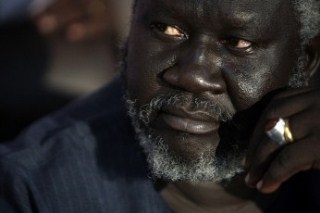Agar slams AUHIP’s decision to exclude his group from talks on Sudan’s Two Areas
January 24, 2018 (KHARTOUM) – Malik Agar the leader of a faction of Sudan People’s Liberation Movement-North (SPLM-N Agar) has swiftly condemned the exclusion of his group form the ceasefire and humanitarian access talks the African Union will hold next month between the government and the SPLM-N led by Abdel Aziz al-Hilu.

The British diplomat who facilitates the process with the other countries of the Troika was referring to the support to al-Hilu of the SPLM-N military command which is mainly composed of Nuba ethnic commanders.
In reaction to these statements, Agar issued a long statement on Wednesday saying this move represents what Khartoum had wished underscoring it does not fit with the UN Security Council resolution 2046 (2012) and African Union decisions for a comprehensive peace in Sudan.
“The idea of inviting only one faction of the SPLM/N to the peace talks in Addis contradicts the principle of inclusivity and is a format that has been imposed by the Government of Sudan. This is why the news is being celebrated today in the state-run media;”
Agar further said “delinking the issues of the Two Areas” from the national issues of democratic reforms responds to the government inspirations for “a piecemeal solution” resisted by the SPLM-N during the past talks.
“This approach will not achieve a durable solution for the people of the Two Areas or Sudan,” Agar said
After 16 months since the last round of talks in August 2016, the AU High-Level Implementation Panel (AUHIP) chaired by President Thabo Mbeki has invited the Sudanese government the SPLM-N al-Hilu’s faction to meet for a new round of peace talks in Addis Ababa on 1 February.
Mbeki invited the Sudan Call forces for a consultations meeting in Addis Ababa on 4-5 February.
Agar regretted that this meeting comes at an unsuitable time as it coincides with the protests by the opposition parties against the increase the rising prices. The participation of the Sudan Call in the meeting may anger the other opposition groups that boycott the AUHIP-led process and breaks the mobilisation.
“The priority for the AUHIP now should be to speak out against this repression and demand the release of all those detained in connection with the current protests,” Agar said as several opposition figures including some of the Sudan call leaders are in jail among the arrested opponents.
In his three-page letter, he said the mediators by excluding them encourage them to look for more arms if they want to be seated at the negotiating table.
He concluded his message by calling on Mbeki and the international facilitators to stick to the holistic approach if they see the need to look for a new process to end war and achieve democratic reforms
“We, therefore, call on the AUHIP to take its responsibilities seriously on the basis of the relevant AUPSC resolutions, to call for the release of all political detainees and to hold genuine consultations with all Sudanese political forces and civil society instead of proceeding with business as usual and convening peace talks designed to achieve a piecemeal solution,” he concluded his message.
Al-Hilu who was the deputy chairman of the unified SPLM-N split from the group and convinced the Nuba Mountains tribes to back him stressing on the need to prioritize demand for the right of self-determination.
Agar and his chief negotiator Yasir Arman focused on the need for a comprehensive solution based on their criticism for the 2005 peace agreement, which led to the secession of South Sudan with resolving the other conflict or bringing democratic reforms.
(ST)
